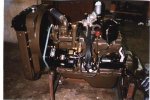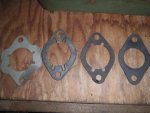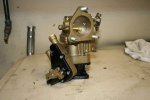GUNNY 155
Member
- 238
- 4
- 18
- Location
- elgin illinois
Okay guys I could use some opinions. I have the stock Dodge 230 that I rebuilt that is also balanced and blueprinted. I have a bit of a flat spot coming off of idle. I have the timing set at about 7 degrees and hesitate to push it farther. I realized that this would be a given using todays fuels rather than what the engine was originally run on. So first question, what is being run for initial timing by you folks out there. BTW I am using 24v all GI ignition system. The advance curve on the distributor is also factory. What I am thinking is the flat spot is caused by a lean accelerator pump. The carb has been rebuilt so all that is fresh. Now I am an old muscle car guy and have plenty of experience with Holley, Carter AFB's and all the 3 duce set ups from back in the day. All those had mechanical accelerator pumps and could be adjusted as rich or as lean as you needed them to be. I have studied the info for the ETW1 on the M37 and realize that the accelerator pump circuit on this carb is vacuum operated so how well it operates is based on manifold pressure and inches of Hg. It also would be logical to assume that there is no way to adjust the function of the accelerator pump. So my second question is this. Is that flat spot just the nature of this carb? When driving I can sort of feather the gas pedal to get around it but it is somewhat annoying. Besides that my OCD side wants perfection when I have this restoration finished. So looking for any advice you guys can toss my way based of experience of solutions you have found.






